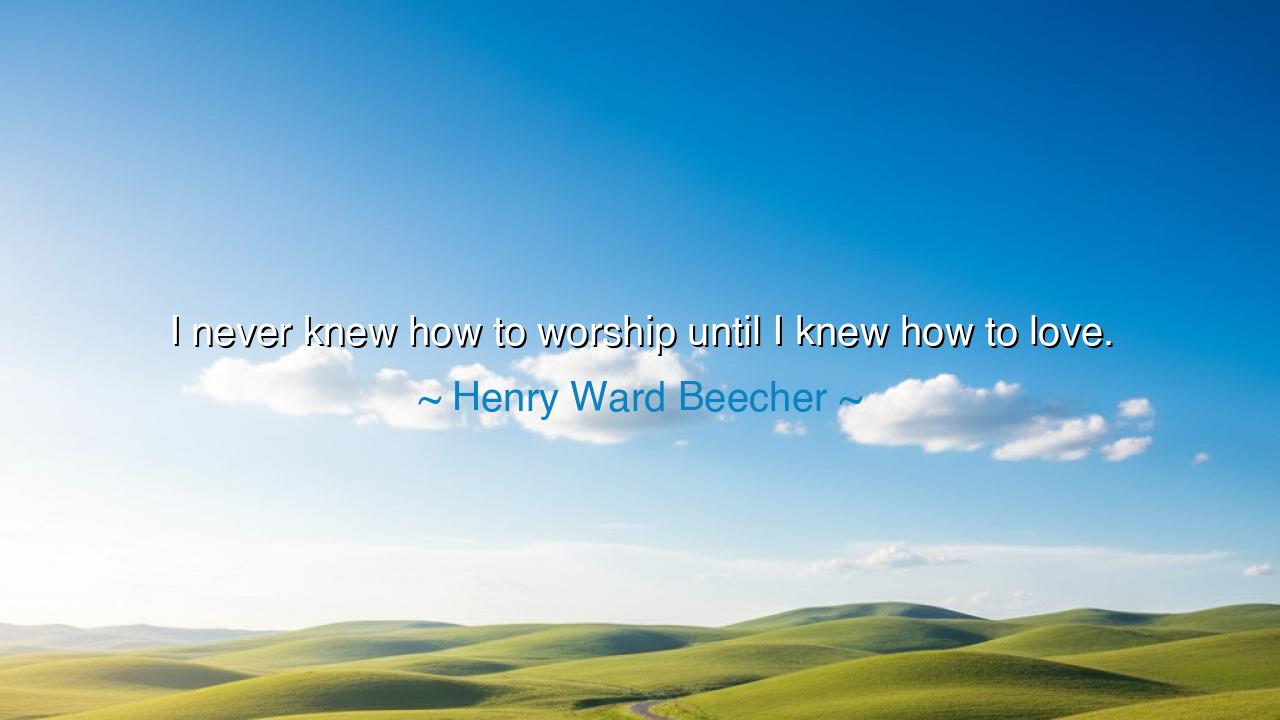
I never knew how to worship until I knew how to love.






“I never knew how to worship until I knew how to love.” Thus spoke Henry Ward Beecher, the great American preacher of the nineteenth century, whose words echoed not only from pulpits but through the very soul of a nation awakening to both faith and freedom. In this luminous declaration, Beecher reveals a truth as ancient as it is divine — that love is the root of worship, the bridge between humanity and God. For to worship without love is hollow ritual, but to love deeply — to see the divine in others, to feel compassion for all living things — is to stand already in the presence of the sacred.
Beecher was not a man of cold theology. He was a reformer of hearts, a voice of conscience during a time of division and slavery in America. His sermons were not chains of doctrine but flames of feeling, urging his listeners to know God not through fear, but through love. The quote arose from his belief that worship must spring from the living soul, not the lips — that true reverence is not found in bowing or chanting alone, but in the awakened capacity to love without limit. In his words, worship is not an act of submission to an external power, but a flowering of the inner spirit — a recognition that the same divine breath that moves through heaven moves also through the heart.
To grasp Beecher’s meaning, one must first understand the difference between religion and worship. Religion may give structure — the rituals, the prayers, the forms — but worship, in its purest sense, is the soul’s response to beauty, goodness, and truth. It is love turned upward and outward, beyond self. Beecher teaches that until we learn to love — not romantically, but spiritually, selflessly — we cannot truly worship, for we have not yet touched the divine nature within us. Love is the language of heaven, and worship is merely its echo in the human heart.
This truth is not confined to Christianity; it beats through all the wisdom of the ages. The Bhagavad Gita speaks of devotion (bhakti) as the highest path — not knowledge, not ritual, but love for the divine. The Sufi poets of Persia, like Rumi, sang of God as the Beloved, declaring that love itself is a form of prayer. Even the Buddha, though he spoke not of a creator, taught compassion as the highest virtue — a love that dissolves all barriers between self and other. In every tradition, those who have touched enlightenment speak with one voice: to love is to worship.
History, too, offers its examples. Consider Saint Francis of Assisi, who saw God in the sun, the rivers, the birds, and the beggar. To him, all creation was sacred because it was loved by the Creator. His worship was not confined to the chapel; it was lived in kindness, simplicity, and care for the least of beings. Francis did not merely love God; he loved through God, and in doing so, he discovered the truest form of worship — not the bending of the knee, but the opening of the heart.
Beecher’s insight also speaks to our modern age, where faith often becomes intellectual rather than experiential. Many know the scriptures, but few know love; many recite prayers, but their hearts remain unmoved. Beecher would say to us: you cannot worship what you do not love, and you cannot love what you do not feel. To love is to see the divine in another’s eyes, to forgive when wronged, to serve without seeking reward. These are the living prayers that reach higher than any song or sermon.
So, my child, take this lesson as a seed for your soul: seek not to worship by word or ritual alone, but by love. When you are kind, you are praying; when you forgive, you are kneeling; when you love without condition, you are standing before God Himself. Do not separate the sacred from the human — for in every act of compassion, in every breath of tenderness, the eternal is already present.
For Henry Ward Beecher’s truth is eternal: the path to heaven begins not in fear, but in love. Only when the heart is opened does the soul truly rise. And when you learn to love — fully, humbly, and without measure — you will find that you have been worshiping all along.






AAdministratorAdministrator
Welcome, honored guests. Please leave a comment, we will respond soon